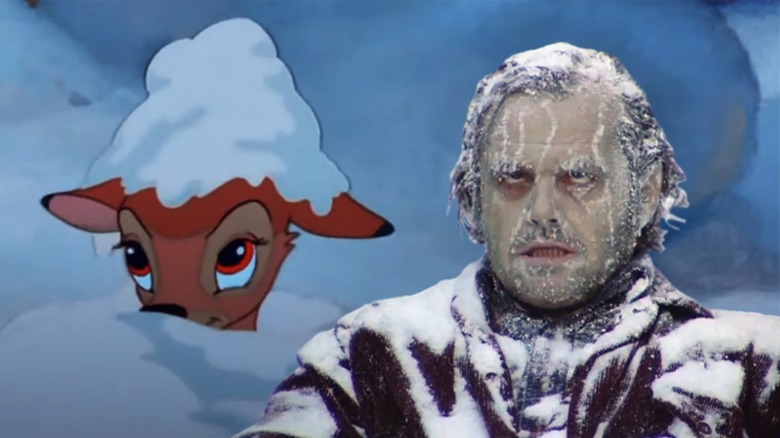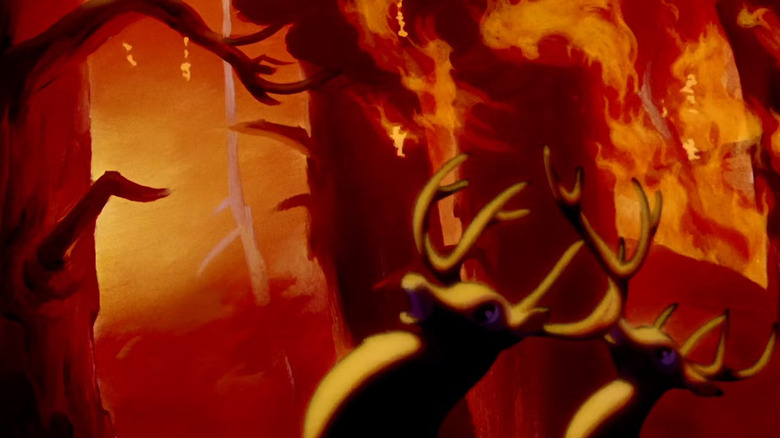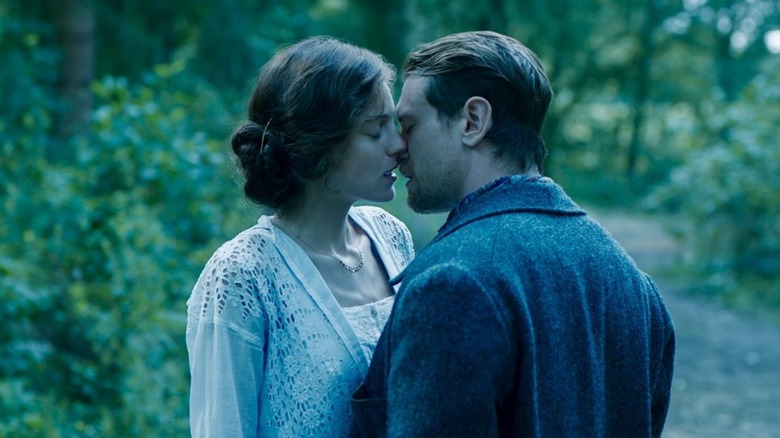The Classic Disney Movie That Inspired Stephen King's Horror Career
Any cinephile will likely be able to tell you about the first time a film scared the bejeezus out of them. For people of my generation, Tobe Hooper's 1982 film "Poltergeist" has a lot to answer for. Because the film bore the name of Steven Spielberg as its producer, and because it was only rated PG (it was made before the inception of the PG-13 rating), Hooper's monstrous horror movie was seen by many young children, unaware of the nightmares that lay within. "Poltergeist" featured a killer clown, a man-eating tree, and a scene where a man, possessed by the evil of the house, pulls all the skin off his own face.
Kids exposed to such horrors at an early age either withdraw from movies altogether ... or become horror filmmakers themselves. It's hard to deny the glorious, visceral power of a good, traumatic movie scare.
Stephen King also had a traumatic horror movie shape his mind at an early age. In a 2014 interview with Rolling Stone, King recalled the exact horror movie that frightened him so badly, he had no choice but to become a horror author. Fear, he found, was a profound emotion, and he had spent several decades writing skin-crawling horror stories to pass his horror movie trauma onto others. The horror movie in question? David D. Hand's 1942 animated classic "Bambi." There is a scene late in "Bambi" wherein the titular talking deer (John Sutherland) is lost in the woods after it had been set ablaze by an interloping human's campfire. For King, that terrifying sequence was enough to scar him for life ... and inspire his whole career.
The fire in Bambi
When King was asked why the bulk of his output was either horror or supernatural, he was frank:
"It's built in. That's all. The first movie I ever saw was a horror movie. It was 'Bambi.' When that little deer gets caught in a forest fire, I was terrified, but I was also exhilarated. I can't explain it. My wife and kids drink coffee. But I don't. I like tea. My wife and kids won't touch a pizza with anchovies on it. But I like anchovies. The stuff I was drawn to was built in as part of my equipment."
It sounds as if King was already innately drawn to horror and "Bambi" merely confirmed that his interests were in-born. Of course, that's a common push-pull one has with anything that inspires us. Did the art inform our personalities or do our already-formed personalities merely and unexpectedly mesh with certain artists? Curiously, King only mentioned the scary forest fire from "Bambi" and not the film's notoriously tragic death. About halfway through "Bambi," the title deer's mom (Paula Winslowe) is out in an open meadow, a dangerous place for deer. They know there's no cover in the meadow and they can easily be targeted by hunters. Bambi's mother is shot and killed in that meadow, which famously traumatized several generations of children. King, instead, remembers the forest fire.
When asked if he was ashamed to have similarly scarred his readers, King wasn't the least bit apologetic:
"No. I thought it was great fun to scare people. I also knew it was socially acceptable because there were a lot of horror movies out there. And I cut my teeth on horror comics like 'The Crypt of Terror.'"
Never feel ashamed, Stephen.
Stephen King's literary inspirations
When it came to his literary inspirations, however, King's tastes ran less to the macabre and more to the Western canon. He seems to like reading classical character pieces, stories of lust, and poetry. Keep in mind, dear reader, that being well-read should be considered a virtue unto itself. Read a lot. Read them again when you're older. And read books written centuries ago. It can only be good for you and there's not a single reason why you shouldn't. King, at any rate, has some favorite authors ... and one he definitely hates. In his own words:
"[Horror is] one of the genres that live 'across the tracks' in the literary community, but what could I do? That's where I was drawn. I love D.H. Lawrence. And James Dickey's poetry, Émile Zola, Steinbeck ... Fitzgerald, not so much. Hemingway, not at all. Hemingway sucks, basically. If people like that, terrific. But if I set out to write that way, what would've come out would've been hollow and lifeless because it wasn't me. And I have to say this: To a degree, I have elevated the horror genre."
King's comments may seem arrogant until you realize that he's actually right. He did indeed elevate pop horror to a new level, becoming one of the best-selling authors of all time. His books have inspired dozens of important feature films, making him into a genre unto himself.
Perhaps someday, however, the 76-year-old author will finally shift away from horror and instead adapt Lawrence's "Lady Chatterly Lover" to the big screen. It would be an interesting experiment. So what if Netflix put out an adaptation in 2022? We could always use many more.


